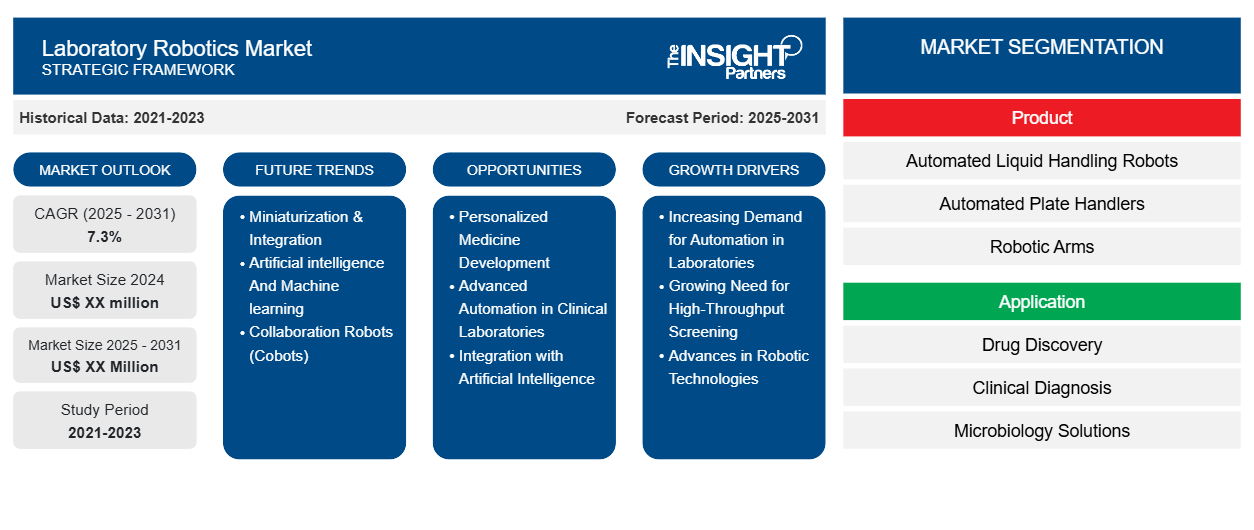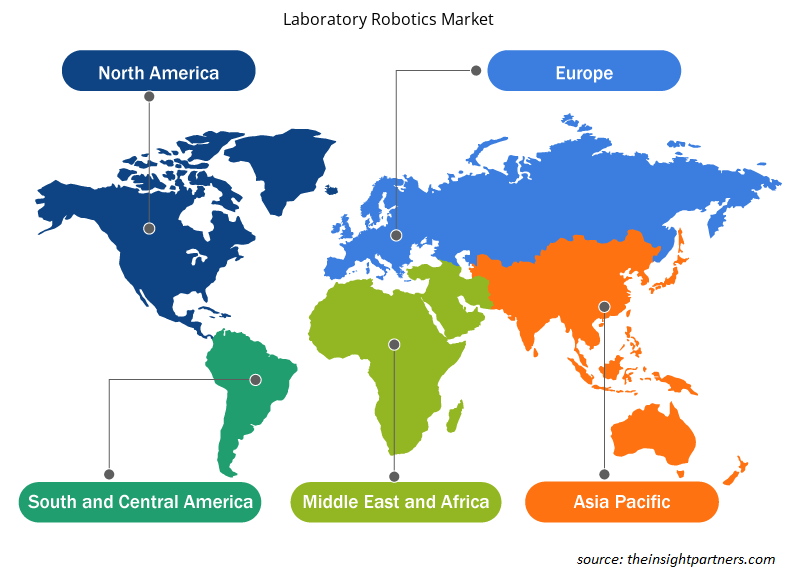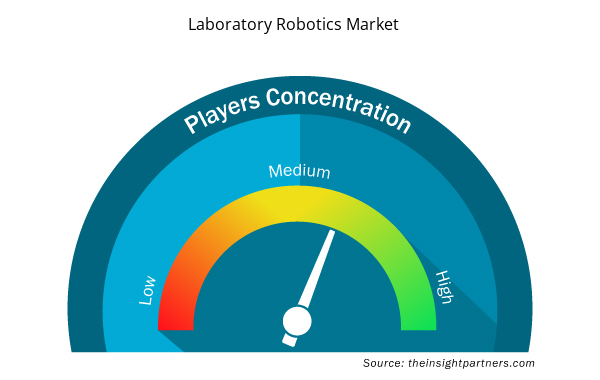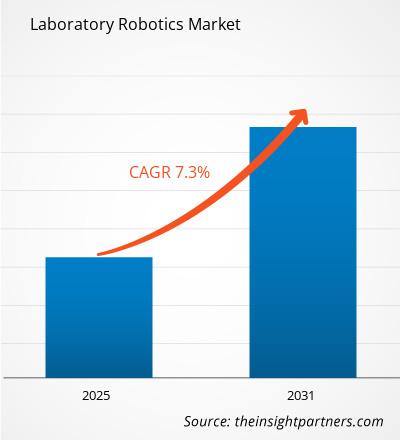The Laboratory Robotics Market is expected to register a CAGR of 7.3% from 2025 to 2031, with a market size expanding from US$ XX million in 2024 to US$ XX Million by 2031.
The report is segmented by Product (Automated Liquid Handling Robots, Automated Plate Handlers, Robotic Arms, Lab Automation Workstations, Microplate Readers and Washers, and Others), Application (Drug Discovery, Clinical Diagnosis, Microbiology Solutions, Genomics Solutions, and Proteomics Solutions), End user (Clinical Laboratory and Research Laboratory)
Purpose of the Report
The report Laboratory Robotics Market by The Insight Partners aims to describe the present landscape and future growth, top driving factors, challenges, and opportunities. This will provide insights to various business stakeholders, such as:
- Technology Providers/Manufacturers: To understand the evolving market dynamics and know the potential growth opportunities, enabling them to make informed strategic decisions.
- Investors: To conduct a comprehensive trend analysis regarding the market growth rate, market financial projections, and opportunities that exist across the value chain.
- Regulatory bodies: To regulate policies and police activities in the market with the aim of minimizing abuse, preserving investor trust and confidence, and upholding the integrity and stability of the market.
Laboratory Robotics Market Segmentation
Product
- Automated Liquid Handling Robots
- Automated Plate Handlers
- Robotic Arms
- Lab Automation Workstations
- Microplate Readers and Washers
- Others
Application
- Drug Discovery
- Clinical Diagnosis
- Microbiology Solutions
- Genomics Solutions
- Proteomics Solutions
End user
- Clinical Laboratory and Research Laboratory
Geography
- North America
- Europe
- Asia-Pacific
- South and Central America
- Middle East and Africa
Customize This Report To Suit Your Requirement
You will get customization on any report - free of charge - including parts of this report, or country-level analysis, Excel Data pack, as well as avail great offers and discounts for start-ups & universities
Laboratory Robotics Market: Strategic Insights

- Get Top Key Market Trends of this report.This FREE sample will include data analysis, ranging from market trends to estimates and forecasts.
Laboratory Robotics Market Growth Drivers
- Increasing Demand for Automation in Laboratories: One of the main factors boosting the growth of the laboratory robotics industry is the increasing need for automation in the laboratories. Every laboratory wants to maximize the efficiency, accuracy, and throughput and for this reason has already started using cognate systems to perform certain basic and repetitive works such as sample preparation and analysis, pipetting, etc. This reduces the chances of error and more investments are likely to be channelled to laboratory robotics.
- Growing Need for High-Throughput Screening: The laboratory robotics industry is growing due to the heightened demand for high-throughput screening during drug design and development stages. In the process of drug development, resarchers have to evaluate and screen a bigger number of sample drugs in the shorter period of time finding the most promising compounds. Robotic infrastructures allow laboratories to design high throughput assays with greater efficiency and speed than is otherwise possible, enhancing the processes of pharmaceutical screening and diagnostic development, shorting the phases of drugs development.
- Advances in Robotic Technologies: All these technological innovations in robotics are advancing the position of laboratory robotic systems into the next frontier. General purpose artificial intelligence, machine intelligence infusion, and sensor technologies integration are some of the benefits of laboratory robots which resulted in sophisticated automation solutions designed for more complex activities that not only increases the efficacy of the endangered operational processes but also increases the extent of usage of laboratory robots.
Laboratory Robotics Market Future Trends
- Miniaturization & Integration: The whole trend of miniaturization and integration in the market of laboratory robotics necessitates the use of small and multi-functional robotic systems. Newer technologies allow laboratories to perform complicated tasks in a lesser area and most importantly at a cheaper cost. These robotic solutions incorporate many functions including, but not limited to, liquid handling, process and sample preparation which provides for the efficient flow of activities, increased output and reproducibility features which modern day lab.
- Artificial intelligence And Machine learning: The intersection of AI and ML with laboratory robotics changes how data is handled and how decisions are made. Such robots use experimental data to inform AI-optimized robots, which can revise their procedures and increase the efficiency of real-time workflow orders. As a result, research development turns out to be faster, more accurate, more foresight, and lab processes are effective and also adjustable to the user’s needs.
- Collaboration Robots (Cobots): In the laboratory context, the use of Cobots, or ‘collaborative robots’ has been on the rise as they can be operated in the presence of human researchers. It reduces the burden on scientists since the majority of the repetitive tasks are performed by robots and the scientists can handle more intricate assessments. Due to their ease of operation and adjustability, cobots, can however accommodate a myriad of applications thus promoting the creativity in the designs of experiments and the projects undertaken.
Laboratory Robotics Market Opportunities
- Personalized Medicine Development: Advancements in the Sphere of Personalized Therapeutics: The capability of laboratory robotics to enhance and facilitate high-throughput screening approaches makes it a crucial component in personalized medicine. Robotic systems can provide the process of drug discovery with more sophistication, and also, assist in the process of the drug administration, based upon the person’s genome which improves health outcomes as well as economic benefits.
- Advanced Automation in Clinical Laboratories: The need for a quick, accurate quality diagnostic test has influenced the use of laboratory robotics in clinical self-care. This has brought about an efficient workflow, minimizing human intervention as well as enabling analysis of diagnostic information on real-time, thus attending to the patients’ needs more promptly. Critical change in the utilization of clinical laboratories has resulted in increased output of services which are beneficial to the patients as the tests are done faster.
- Integration with Artificial Intelligence: Acceptance of Artificial Intelligence in the Automation of Laboratories: With the development of artificial intelligence, fun application in research tasks optimization has become available in the field of laboratory robotics. Robotic systems enable lots of information to be collected instantly._AI is able to use this information and do both, find out that something is wrong within the statistics and also how this statistics evolve over time which can normally be too advanced even for a trained person. The interface of AI and robotics has improved the scope of the experimental design in the tasks and this has stimulated the ingenuity in biotechnology and new drug designs.
Laboratory Robotics Market Regional Insights
The regional trends and factors influencing the Laboratory Robotics Market throughout the forecast period have been thoroughly explained by the analysts at Insight Partners. This section also discusses Laboratory Robotics Market segments and geography across North America, Europe, Asia Pacific, Middle East and Africa, and South and Central America.

- Get the Regional Specific Data for Laboratory Robotics Market
Laboratory Robotics Market Report Scope
| Report Attribute | Details |
|---|---|
| Market size in 2024 | US$ XX million |
| Market Size by 2031 | US$ XX Million |
| Global CAGR (2025 - 2031) | 7.3% |
| Historical Data | 2021-2023 |
| Forecast period | 2025-2031 |
| Segments Covered |
By Product
|
| Regions and Countries Covered | North America
|
| Market leaders and key company profiles |
Laboratory Robotics Market Players Density: Understanding Its Impact on Business Dynamics
The Laboratory Robotics Market market is growing rapidly, driven by increasing end-user demand due to factors such as evolving consumer preferences, technological advancements, and greater awareness of the product's benefits. As demand rises, businesses are expanding their offerings, innovating to meet consumer needs, and capitalizing on emerging trends, which further fuels market growth.
Market players density refers to the distribution of firms or companies operating within a particular market or industry. It indicates how many competitors (market players) are present in a given market space relative to its size or total market value.
Major Companies operating in the Laboratory Robotics Market are:
- AB Controls
- ALS Automated Lab Solutions
- Beckman Coulter Inc.
- Cleveland Automation Engineering
- Hudson Robotics
Disclaimer: The companies listed above are not ranked in any particular order.

- Get the Laboratory Robotics Market top key players overview
Key Selling Points
- Comprehensive Coverage: The report comprehensively covers the analysis of products, services, types, and end users of the Laboratory Robotics Market, providing a holistic landscape.
- Expert Analysis: The report is compiled based on the in-depth understanding of industry experts and analysts.
- Up-to-date Information: The report assures business relevance due to its coverage of recent information and data trends.
- Customization Options: This report can be customized to cater to specific client requirements and suit the business strategies aptly.
The research report on the Laboratory Robotics Market can, therefore, help spearhead the trail of decoding and understanding the industry scenario and growth prospects. Although there can be a few valid concerns, the overall benefits of this report tend to outweigh the disadvantages.
- Historical Analysis (2 Years), Base Year, Forecast (7 Years) with CAGR
- PEST and SWOT Analysis
- Market Size Value / Volume - Global, Regional, Country
- Industry and Competitive Landscape
- Excel Dataset



Report Coverage
Revenue forecast, Company Analysis, Industry landscape, Growth factors, and Trends

Segment Covered
This text is related
to segments covered.

Regional Scope
North America, Europe, Asia Pacific, Middle East & Africa, South & Central America

Country Scope
This text is related
to country scope.
Frequently Asked Questions
The laboratory robotics market is estimated to grow with a CAGR of 7.2% from 2023 to 2031.
Asia Pacific region is likely to witness fastest growth rate during the forecast period.
The laboratory robotics market majorly consists of the players such as XX among others.
The market drivers include increasing demand for automation in laboratories and growing need for high-throughput screening are driving the laboratory robotics market
Miniaturization & integration are likely to remain the key trend during the forecast period
North America dominated the laboratory robotics market in 2023
Trends and growth analysis reports related to Life Sciences : READ MORE..
The List of Companies
1. AB Controls
2. ALS Automated Lab Solutions
3. Beckman Coulter Inc.
4. Cleveland Automation Engineering
5. Hudson Robotics
6. Peak Analysis and Automation (PAA)
7. Tecan Group
8. Thermo Fisher Scientific
9. Universal Robots
10. Yaskawa Electric

 Get Free Sample For
Get Free Sample For